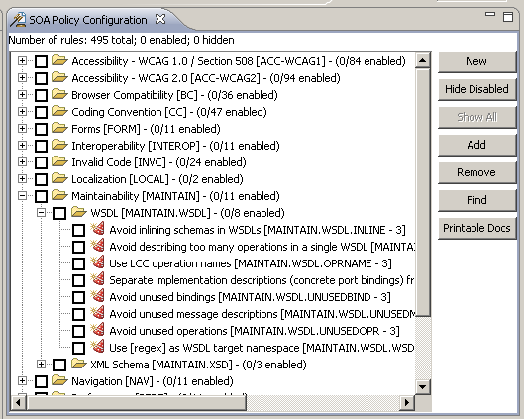This topic explains how to define and share a policy for your group.
Sections include:
Defining a Group Policy
In SOAtest a policy consists of a set of assertions or rules. SOAtest enforces a policy by creating tests that check those rules. When creating tests from WSDL with a policy file, SOAtest creates "policy enforcer" tests.
SOAtest ships with a default policy file that addresses the key concerns for a web service in an SOA, such as interoperability and compliance to industry standards, as well as maintainability and best practices. We strongly recommend that the team’s architect customize this policy to suit the team’s specific needs.
To define a custom SOA policy:
- Select File> New> Policy Configuration.
- Specify a name and location for the policy, then click Finish.
- The Policy Configuration panel displays in the right GUI pane of SOAtest and lists assertions that correspond to policy enforcement rules and WSDL tests.
- The Policy Configuration panel displays in the right GUI pane of SOAtest and lists assertions that correspond to policy enforcement rules and WSDL tests.
- From the Policy Configuration panel, you can:
- Enable/disable individual rules or groups of rules by selecting or clearing the available check boxes.
- Customize a parameterizable rule by right-clicking it, choosing View/Change Rule Parameters from the shortcut menu, then modifying settings as needed. Parameterized rules are marked with a special icon (a wizard hat with a radio button):
- Search for a rule by clicking thе Find button, then using that dialog to search for the rule.
- Hide the rules that are not enabled by clicking the Hide Disabled button. If you later want all rules displayed, click Show All.
- Define custom rules in RuleWizard by clicking New, then using the RuleWizard graphical editor or automated generator to create new rules. Once custom rules are defined, add them to the rule tree by clicking Add, then enable them. For details, open the RuleWizard User Guide by clicking New in this panel, then choosing Help> Documentation from within the RuleWizard GUI.
- View a description of a rule by right-clicking the node that represents that rule, then choosing View Rule Documentation from the shortcut menu
- Click Save to save the custom policy to the location you previously specified. The policy configuration you define can be used later to automatically create tests to enforce policies as described in Enforcing Policies on WSDLs, Schemas, and SOAP Messages.
Sharing Policy Files across the Group
Once you have created your policy configuration files and custom rules, they can be shared so that all team members will have access to them in their own testing environments. Policy configuration files can be uploaded to Team Server through the Team Server web interface as described in the Team Server user’s guide. Rules can be also added to Team Server by choosing Parasoft> Explore> Team Server, then opening the Rules tab and uploading rules.
You can also share policy configuration files via source control.

